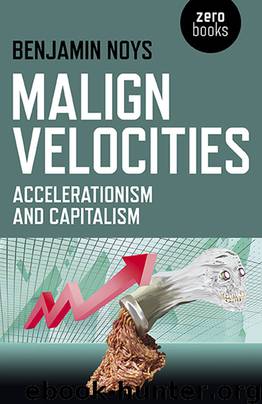Malign Velocities: Accelerationism and Capitalism by Noys Benjamin

Author:Noys, Benjamin [Noys, Benjamin]
Language: eng
Format: epub
ISBN: 978-1-78279-299-4
Publisher: John Hunt (NBN)
Published: 2014-10-30T16:00:00+00:00
Machinic revolution must therefore go in the opposite direction to socialistic regulation; pressing towards ever more uninhibited marketization of the processes that are tearing down the social field, ‘still further’ with ‘the movement of the market, of decoding and deterritorialization’ and ‘one can never go far enough in the direction of deterritorialization: you haven’t seen anything yet’.13
Machinic revolution, in Land’s metaphysics, reaches out to the horizon of absolute deterritorialization – the realized capitalism that has decapitated itself into full-blown immanent marketization.
This posing of the market against capitalism was derived from the historian Fernand Braudel. Obviously markets have preexisted capitalism, and Braudel suggested that capitalism formed itself as a monopolistic anti-market, tying down exchange. For Braudel, however, the virtue of markets was that they were face-to-face, localized and controllable. The problem of capitalism as anti-market, especially financialized capitalism, was that it was speculative, opaque and exceptional.14 Land mutates this argument to identify markets with monstrously powerful cybernetic forces, which are ‘speculative, opaque and exceptional’. It is these forces of exchange that can resist the stagnations of capitalism. A purified capitalism, shedding the dictates of the State, would traverse to a pure market accelerated out of capitalism altogether.
This theory fed-off the localized economic ‘boom’ of the ’90s in which, at least in the UK and US, regimes claiming some tenuous and residual connection to social democracy instantiated a further deepening of the neoliberal project. It would be this coupling of attenuated social-democracy and neo-liberalism that bred a series of ideological tropes that dominate the perception of that moment, the ’00s, and the present time of crisis. In this discourse it was the ‘left’ (or pseudo-left), and the ‘left’ in State power, that authorized, ratified and exacerbated the excesses of financialization and consumer credit. It was the spending of the State and the public sector, not the excesses of capitalism, which came to be treated as the ‘dead weight’ that is now holding us back from another leap into the future. Politicians of the present can play the austerity card in the elimination of this State and public debt, while accelerationist positions can argue that the only problem was the State itself, which did not unleash these processes far enough. It was the ‘humanist’ residues of State spending that failed to measure up to the anti-humanism of capitalism.
The position of the CCRU, despite its radicalized antihumanism and inhuman immersive promise of capitalism exploding its own limits, resonates with these contemporary ideological claims that capitalism wasn’t really allowed to follow through. In this narrative, the acceleration of capitalism was held back by State spending and State regulation (focused, in the UK, often on ‘health-and-safety’, as in the trope of ‘health-and-safety gone mad’). It was a ‘left’ failure of nerve to go all the way to capitalism (and not all the way to the left…), that leaves us in the situation we find ourselves in.
This story of constrained capitalism was coupled, in the work of Nick Land, to a switch to China as the only
Download
This site does not store any files on its server. We only index and link to content provided by other sites. Please contact the content providers to delete copyright contents if any and email us, we'll remove relevant links or contents immediately.
Born to Run: by Christopher McDougall(7127)
The Leavers by Lisa Ko(6948)
iGen by Jean M. Twenge(5416)
Sapiens by Yuval Noah Harari(5372)
Spare by Prince Harry The Duke of Sussex(5197)
The Kite Runner by Khaled Hosseini(5180)
Machine Learning at Scale with H2O by Gregory Keys | David Whiting(4313)
Bullshit Jobs by David Graeber(4190)
Never by Ken Follett(3957)
Goodbye Paradise(3810)
Livewired by David Eagleman(3775)
Fairy Tale by Stephen King(3399)
A Dictionary of Sociology by Unknown(3085)
Harry Potter 4 - Harry Potter and The Goblet of Fire by J.K.Rowling(3074)
The Social Psychology of Inequality by Unknown(3031)
The Club by A.L. Brooks(2926)
Will by Will Smith(2920)
0041152001443424520 .pdf by Unknown(2846)
People of the Earth: An Introduction to World Prehistory by Dr. Brian Fagan & Nadia Durrani(2738)
